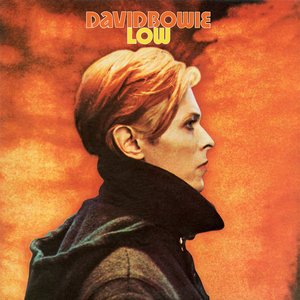Low is the eleventh studio album by British musician David Bowie, co-produc… Read Full Bio ↴Low is the eleventh studio album by British musician David Bowie, co-produced by Bowie and Tony Visconti.
Widely regarded as one of Bowie's most influential releases, Low was the first of the "Berlin Trilogy", a series of collaborations with Brian Eno (though the album was mainly recorded in France and only mixed in West Berlin). The experimental, avant-garde style would be further explored on "Heroes" and Lodger. The album's working title was New Music Night and Day.
The genesis of Low lies in both the foundations laid by Bowie's previous album Station to Station, and music he intended for the soundtrack to The Man Who Fell to Earth. When Bowie presented his material for the film to Nicolas Roeg, the director decided that it would not be suitable. Roeg preferred a more folksy sound, although John Phillips (the chosen composer for the soundtrack) described Bowie's contributions as "haunting and beautiful". Elements from these pieces were incorporated into Low instead. The album's cover, like Station to Station, is a still from the movie: the photographic image, under the album's title, formed a deliberate pun on the phrase "low profile".
David Bowie – vocals (2-6, 8, 10-12, 14), saxophones (4, 11), guitar (6, 9-11), pump bass (6), harmonica (7), vibraphone (9-10), xylophone (10), pre-arranged percussion (10), keyboards: ARP synthesiser (1, 10), Chamberlin: Credited on the album sleeve notes as "tape horn and brass" (1), "synthetic strings" (1, 4, 9-10), "tape cellos" (5) and "tape sax section" (7), piano (7, 9-11), "instruments" (13)
Brian Eno – keyboards: splinter Minimoog (2), report ARP (3), rimmer E.M.I. (3), E.M.I. (5), Minimoog (8-9), piano (7-9), Chamberlin (8-9), other synthesisers, vocals (4, 14), guitar treatments (5), synthetics (7), "instruments" (12-13)
Carlos Alomar – rhythm guitars (1, 3-7, 14), guitar (2)
Dennis Davis – percussion (1-7, 14)
George Murray – bass (1-7, 11, 14)
Ricky Gardiner – rhythm guitar (2), guitar (3-7, 14)
Roy Young – pianos (1, 3-7, 14), Farfisa organ (3, 5)
Widely regarded as one of Bowie's most influential releases, Low was the first of the "Berlin Trilogy", a series of collaborations with Brian Eno (though the album was mainly recorded in France and only mixed in West Berlin). The experimental, avant-garde style would be further explored on "Heroes" and Lodger. The album's working title was New Music Night and Day.
The genesis of Low lies in both the foundations laid by Bowie's previous album Station to Station, and music he intended for the soundtrack to The Man Who Fell to Earth. When Bowie presented his material for the film to Nicolas Roeg, the director decided that it would not be suitable. Roeg preferred a more folksy sound, although John Phillips (the chosen composer for the soundtrack) described Bowie's contributions as "haunting and beautiful". Elements from these pieces were incorporated into Low instead. The album's cover, like Station to Station, is a still from the movie: the photographic image, under the album's title, formed a deliberate pun on the phrase "low profile".
David Bowie – vocals (2-6, 8, 10-12, 14), saxophones (4, 11), guitar (6, 9-11), pump bass (6), harmonica (7), vibraphone (9-10), xylophone (10), pre-arranged percussion (10), keyboards: ARP synthesiser (1, 10), Chamberlin: Credited on the album sleeve notes as "tape horn and brass" (1), "synthetic strings" (1, 4, 9-10), "tape cellos" (5) and "tape sax section" (7), piano (7, 9-11), "instruments" (13)
Brian Eno – keyboards: splinter Minimoog (2), report ARP (3), rimmer E.M.I. (3), E.M.I. (5), Minimoog (8-9), piano (7-9), Chamberlin (8-9), other synthesisers, vocals (4, 14), guitar treatments (5), synthetics (7), "instruments" (12-13)
Carlos Alomar – rhythm guitars (1, 3-7, 14), guitar (2)
Dennis Davis – percussion (1-7, 14)
George Murray – bass (1-7, 11, 14)
Ricky Gardiner – rhythm guitar (2), guitar (3-7, 14)
Roy Young – pianos (1, 3-7, 14), Farfisa organ (3, 5)
More Genres
No Artists Found
More Artists
Load All
No Albums Found
More Albums
Load All
No Tracks Found
Genre not found
Artist not found
Album not found
Search results not found
Song not found
Low
David Bowie Lyrics
A New Career in a New Town Instrumental…
Always Crashing in the Same Car Every chance, every chance that I take I take it on…
Be My Wife Sometimes you get so lonely Sometimes you get nowhere I've l…
Breaking Glass Baby, I've been, breaking glass in your room again Listen D…
Sound and Vision Ah Ah Doo, doo, doo, doo, doo, doo Doo, doo, doo, doo, doo,…
Subterraneans Share bright failing star Care-line Care-line Care-line Car…
Warszawa Mmmm-mm-mm-ommm Sula vie dilejo Mmmm-mm-mm-ommm Sula vie mi…
What in the World You're just a little girl with grey eyes Never mind, say…

DrJKintobor
on I Can't Give Everything Away
I can totally imagine this being the end theme of Sabrina Online, when Sabrina marries Richard and they drive off into the sunset...
Peter Bonney
on Diamond Dogs
If you like free music and you have google chrome, try this free app .SonicHits .